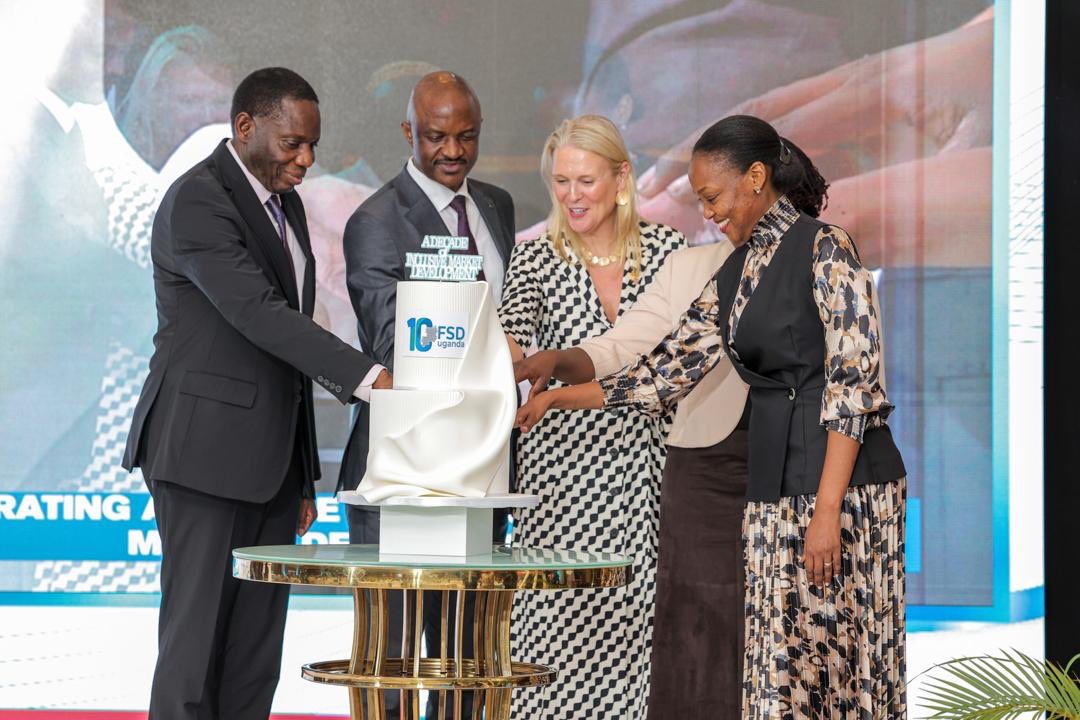Uganda’s financial sector is entering a new era of opportunity, stability, and innovation, as Financial Sector Deepening Uganda (FSD Uganda) marked its 10-year milestone with bold projections for the future.
The anniversary celebration brought together top government officials, development partners, regulators, and private-sector leaders—all reaffirming their commitment to building an inclusive financial system that works for every Ugandan.
Acting Executive Director Sarah Byabazaire reflected on FSD Uganda’s journey from its inception a decade ago, backed by the UK government’s vision for deepening financial inclusion.
She noted that while Uganda has made remarkable progress expanding access to financial services, significant barriers remain particularly around affordability and trust.
“We started with one fundamental question,” Byabazaire said. “How do we build a truly inclusive financial system that serves all people, regardless of background? A decade later, we’ve laid a strong foundation—but there is more to do.”
FSD Uganda today is prioritising seamless and safe information exchange across platforms, enabling Ugandans to use financial tools confidently while unlocking job creation and broader economic opportunities.
The organisation’s long-term ambition is to raise $5 billion by 2040 to drive inclusive financial systems across the region.
FSD Uganda Board Chair Emma Mugisha emphasised that the institution’s progress is rooted in strong governance, donor confidence, and strategic leadership.
“Tonight, we celebrate ten years of partnership, prudent stewardship and shared purpose,” Mugisha said.
She highlighted the contributions of funders the FCDO, Gates Foundation, Mastercard Foundation, European Union, TradeMark Africa and others for trusting FSD Uganda to drive the national financial inclusion agenda.
The Board’s dual oversight structure programme oversight and institutional oversight has ensured transparency, accountability, and compliance with both donor and regulatory standards.
This disciplined structure, Mugisha noted, is what has cemented FSD’s credibility as a neutral, reliable facilitator within Uganda’s financial markets.
British High Commissioner Lisa Chesney celebrated Uganda’s dramatic progress over the past decade. When the UK’s Financial Inclusion Programme began in 2012, only 52% of Ugandan adults had access to financial services.
Today, that number has climbed to 88%, with 77% using formal services—including banks, SACCOs, and mobile money. Mobile money now accounts for over 60% of all financial transactions, while the number of licensed financial institutions has doubled.
“These are not just statistics,” Chesney said. “Behind them are millions of Ugandans who can now save securely, send and receive money easily, and access credit to grow their businesses.”
Through fintech innovations, refugee finance solutions, SACCO payment systems, and Africa’s first shared agent banking platform, FSD Uganda has expanded access for 1.6 million people nearly half of them women and supported over 144,000 small enterprises.
Chesney shared the story of Grace, a dairy farmer who moved from cash-only transactions to digitally recorded milk sales allowing her to build a credit history and secure a commercial loan.
“This is inclusion in action empowerment and dignity,” she said.
Bank of Uganda Governor Michael Atingi-Ego outlined the central bank’s forward-looking vision: a resilient, innovative financial sector anchored in digital transformation and long-term financing.
He highlighted milestones such as the national payments system and the exploration of a central bank digital currency.
Atingi-Ego emphasized upcoming opportunities particularly in oil and gas, capital markets, and digital financial services.
Uganda’s fixed-income market, he said, is expanding to include green bonds, social bonds, and infrastructure bonds to attract diverse investment. The Bank of Uganda is also prioritising pension sector reforms to unlock longer-term capital for national development.
“Our mandate is clear: ensure that long-term capital flows abundantly to the sectors that will drive Uganda’s transformation,” he noted.
Permanent Secretary & Secretary to the Treasury Ramathan Ggoobi praised FSD Uganda’s contribution to the national Financial Sector Development Strategy.
Ggoobi stressed the need to de-risk SMEs, deepen capital markets, support climate-smart finance, and promote policy coherence.
“Government was created to de-risk—that is our role,” he said. “We are ready to work with you to ensure businesses can grow sustainably.”
Ggoobi emphasised the importance of research and evidence-based policymaking, noting that FSDU’s data-driven approach continues to influence smart regulation and financial sector development.
“We promise one thing: government will remain committed to enabling the environment that supports innovation, partnerships, and long-term investment,” he concluded.
As FSD Uganda steps into its next decade, leaders agree on one thing: the journey ahead will be defined by innovation, digital transformation, and inclusion that goes beyond access to meaningful usage.
With strengthened collaboration between government, regulators, development partners, and private-sector actors, Uganda is positioning itself for a resilient financial future one where every Ugandan can participate in and benefit from the nation’s growing economy.


